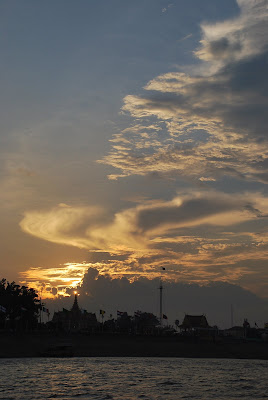
In all honesty, I was not expecting much out of Phnom Penh. I expected the worst. I expected nothing less than rampant poverty, depravity and a city crumbling under the weight of its tragic past and the corruption and degradation of its present. I was prepared to come face to face with the worst that the Third World could throw at me. Phnom Penh was, in my mind, little more than a stopover on our way to Angkor Wat, with the exception of a few sites of historical interest. Apart from that, there was nothing worth seeing. I was wrong.
Phnom Penh is a city with character, with all of its charm and imperfections laid bare for all to see. It is a city of of contrasts, growing in size and affluence, while at the same time many of its residents continue to live in absolute poverty - perhaps no better example exists than along the shores of the Tonle Sap, where remnants of Cambodia's colonial past, now converted into bars and hotels for rich tourists, overlook the hundreds of fishermen whose small wooden boats serve the dual purpose of being home and livelihood.
Along the Tonle Sap




It is a city of magnificent architecture displaying the artistry of human ingenuity, while at the same time bearing testament to the worse that mankind has to offer. Alongside monuments to its rich royal heritage and spirituality lie the remains of torture and genocide - the Killing Fields and the Tuol Sleng Museum - epicenters of the Khmer Rouge's systematic destruction of Cambodian society. The silenced voices of those who perished there remain, the essence of their spirits lingering in the brick and mortar and open graves that reveal the aftermath of untold horror.
The Royal Palace


Open graves from the killing fields outside of Phnom Penh

Tuol Sleng Museum (A former school that had been converted by the Khmer Rouge into a torture prison)



It is a city where the gap between the rich and the poor could not be wider. Child prostitution thrives and corruption at all levels of government hinders progress and limits prosperity to a handful of the elite. Hospitals and other social services are all but non-existent, as are gas stations, which in their stead can be found street-side vendors with empty liquor bottles filled with petrol. Yet there is still a sense of hope in the faces of the people, whose wide smiles and sense of humour reveal that despite the struggles that they face on a daily basis, there is a sense of purpose and a desire to continue moving forward.

Next: Angkor What?
No comments:
Post a Comment